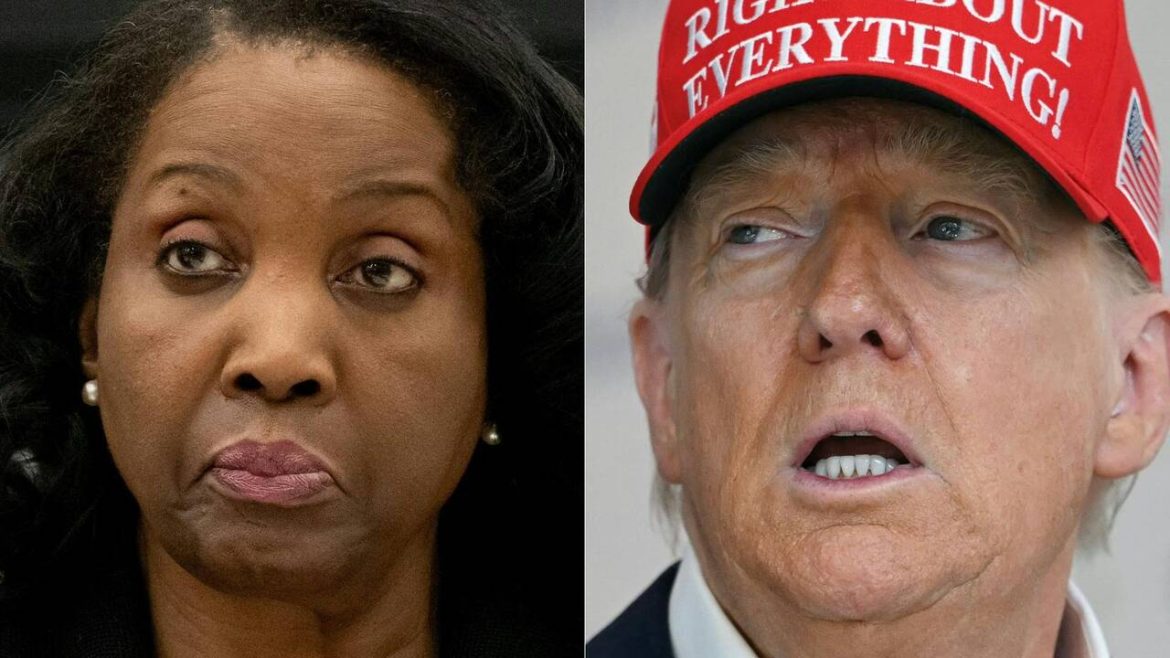52
The governor of the Federal Reserve temporarily restored the appeal pending
Washington DC – A Washington Federal Judge authorized Lisa Cook, governor of the Federal Reserve, to continue to sit on the board of directors while a legal challenge to his attempted revocation. The decision arrived just before the next meeting of the Central Bank concerning the interest rate policy. This decision focuses on issues concerning the legality of the potential deletion of Cook from its functions.
Legal battle for withdrawal
Justice Jia Cobb closes that Governor Cook demonstrates a probability of success on certain arguments, in particular the assertion that former President Donald Trump violated the federal law by trying to withdraw it without establishing a “valid reason”. The judge stressed that the country’s interest in maintaining the independence of the federal reserve has strengthened the argument of its reintegration. This affair marks the first challenge of this kind in 111 years in the history of the federal reserve.
Accusations and precedents of the Supreme Court
Lisa Cook, the first African-American woman to sit on the Council of Governors of the Federal Reserve, was appointed by President Joe Biden in 2022. She faces accusations of allies of Donald Trump alleging false statements taken in touch with mortgage loan requests in 2021. The COBB judge stressed that the situation of Cook is unique – the first revocation in more than a century – and questioned the basis of the accusations leveled by the previous management. The court said that the dose of “valid reason” does not intervene to reject someone for actions prior to their appointment.
Trump’s silence and potential implications
Donald Trump remained silent when he was approached by journalists asking for comments on the court’s decision before a restaurant in Washington on Tuesday evening. Abbé David Lowell, legal advisor to Lisa Cook, praised the judge’s decision as a reaffirmation of the independence of the federal reserve and a rejection of an illegal political intervention. He argued that allowing a president to withdraw a governor on the basis of unfounded complaints would destabilize the financial system and undermine the rule of law. Cook’s withdrawal would have potentially opened the door to Donald Trump to appoint a successor aligned with his preference for lower interest rates, a position for which he publicly recommended.
| Key figure | role | affiliation |
|---|---|---|
| Lisa Cook | Governor of the Federal Reserve | Appointed by Joe Biden |
| Jia COBB | Judge | American district courtyard |
| Donald Trump | Former president | Dismissal procedure |
Did you know? The federal reserve system was created in 1913 after a series of financial panics to provide a more stable monetary and financial system for the United States.
Pro advice: Staying informed of the decisions of the federal reserve is crucial to understanding changes in the economy and potential impacts on personal finances.
What do you think of the implications of this decision on the independence of the federal reserve? Do you think that the accusations against Governor Cook are worth a more in-depth investigation?
Understand the Federal Reserve and its governors
The Federal Reserve system is the United States central bank, responsible for monetary policy and financial regulations. The Council of Governors, made up of seven members appointed by the president and confirmed by the Senate, plays an essential role in the development of these policies. These governors have substantial influence on interest rates, inflation and global economic stability. Their independence of political pressure is considered vital to maintain public confidence and financial stability. According to the Federal Reserve website, the FOMC (Federal Open Market Committee) generally meets eight times a year to assess economic conditions and determine the appropriate monetary policy.
Learn more about the Federal Reserve
Questions frequently asked about the federal reserve
- What is the role of a governor of the federal reserve? A governor helps to establish a monetary policy, oversees banks and contributes to the stability of the American financial system.
- Can a governor of the federal reserve be removed from his duties? Yes, but only “for good reason”, according to the recent decisions of the Supreme Court.
- What does “for the cause” mean in the context of the elimination of a Fed governor? He generally refers to a professional fault or a non-compliance with their functions.
- Why is the independence of the federal reserve important? Independence protects monetary policy from short -term political pressures, promoting long -term economic health.
- What is the FOMC and what does it do? The Federal Open Market Committee establishes the country’s monetary policy, mainly by adjusting interest rates.
- What is the average duration of a governor of the federal reserve? Each governor serves a 14 -year term.
- How does the federal reserve have an impact on daily citizens? Fed decisions on interest rates influence borrowing costs for things like mortgages, car loans and credit cards.
Share your reflections on this development story in the comments below!
What legal precedents concerning the executive privilege and the protection of denunciators are the most relevant for this case?
The recent decision of a federal court to temporarily arrest the dismissal of a high high -ranking federal official is to send undulations via Washington, DC, and to raise serious questions about the independence of the Ministry of Justice and the capacity of Biden management to promulgate personnel changes. This case, implying[InsertOfficial’sNameandAgency-[InsertOfficial’sNameandAgency-research needed]highlights an increasing tension between the presidential authority and judicial surveillance in matters of federal employment. The implications extend beyond this unique case, which can have an impact on future attempts to reform and restructure government agencies.
Understanding the intervention of the Court
The court’s decision, rendered on September 9, 2025, focuses on allegations that the dismissal was politically motivated and violated public service protections. More specifically, the trial claims that the official has been targeted[Statethereasonfordismissalasallegedinthelawsuit-[Statethereasonfordismissalasallegedinthelawsuit-research needed]A complaint that the administration denies.
Here is a ventilation of key arguments:
The applicant’s argument: The licensed official alleys a violation of the Hatch law, which limits the political activities partisan of federal employees and the rights of the regular procedure. They argue that the dismissal was reprisals for[Specificactionorstancetakenbytheofficial-[Specificactionorstancetakenbytheofficial-research needed].
Defense of the administration: The Ministry of Justice maintains that dismissal was based on legitimate performance problems and is the authority of the president to withdraw the appointed officials. They cite[Citespecificlegalprecedentorjustificationusedbytheadministration-[Citespecificlegalprecedentorjustificationusedbytheadministration-research needed].
The reasoning of the court: The judge granted a temporary prohibition order, citing concerns about the irreparable damage to the official and the need for a more in -depth investigation into the circumstances surrounding the dismissal. The court stressed the importance of protecting the integrity of the public service.
This legal battle underlines the complexities of navigation on federal employment law and the delicate balance between executive power and judicial control. Terms such as “unjustified dismissal”, “federal rights of employees” and “administrative law” are essential to the understanding of this case.
The impact on the independence of the Ministry of Justice
The intervention of the Court fueled the concerns about the independence of the Ministry of Justice. Critics argue that any interference perceived with the president’s ability to withdraw civil servants could politicize the department and undermine its ability to prosecute justice impartially.
Consider these points:
- Cooling effect: The decision can create a “scary effect”, discouraging the administration from taking decisive measures to deal with misconduct or ineffectiveness perceived within federal agencies.
- Lignit lime: We can anticipate an increase in prosecution of federal employees questioning the unfavorable actions of staff, by combining the courts and the Ministry of Justice more.
- Political polarization: The case is very likely to become a focal point for the political debate, the Republicans accusing the Biden administration of overcoming and the Democrats defending the need to protect civil servants against political interference.
The debate on the “executive privilege” and the scope of the presidential authority are at the heart of this discussion. The case also raises questions on the role of “protection of denunciators” and the extent to which federal employees should be protected from reprisals for reporting reprehensible acts.
Implications for federal agencies reform
Beyond the immediate legal battle, this case has broader implications for the efforts of the Biden administration to reform and restructure federal agencies. The administration is committed to prioritizing diversity, equity and inclusion in federal hiring and promotion practices, and to solve the systemic problems of racial and gender biases.
However, these efforts could be hampered if the administration is faced with legal challenges whenever it is trying to withdraw or reassign civil servants.
Rationalize the government: Administration plans to rationalize government operations and reduce bureaucratic waste could be blocked by prolonged legal battles on personnel decisions.
Regarding responsibility: The decision could make federal employees responsible for a fault or poor performance, potentially undergoing public confidence in the government.
Implementation of politics: Delays in staff changes could slow down the implementation of the main political initiatives, an impact on areas such as climate change, health care and economic recovery.
Case studies: battles spent on federal layoffs
This is not the first time that a federal court has been an issue in a dispute over the rejection of a federal official. Several high level cases of recent years offer a precious context:
The 2017 dismissal of Preet Bharara: The brutal dismissal of the American lawyer Preet Bharara by the Trump administration aroused controversy and raised questions on political interference in the application of laws.
**
https://www.youtube.com/watch?v=L4EW9CQL-N8
Related
Source link
#judgment #Federal #Court #dismissal #official #Fed #Sape #efforts #justice #Archyde

